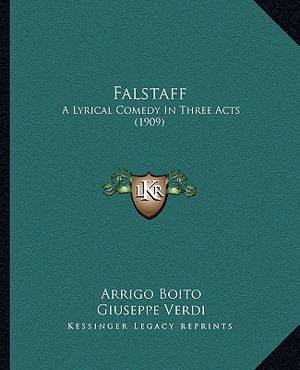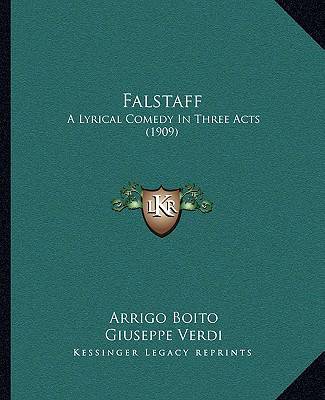
- Afhalen na 1 uur in een winkel met voorraad
- Gratis thuislevering in België vanaf € 30
- Ruim aanbod met 7 miljoen producten
- Afhalen na 1 uur in een winkel met voorraad
- Gratis thuislevering in België vanaf € 30
- Ruim aanbod met 7 miljoen producten
Zoeken
€ 29,95
+ 59 punten
Omschrijving
Falstaff: A Lyrical Comedy In Three Acts is a play written by Italian composer and librettist, Arrigo Boito. The play is based on William Shakespeare's character Sir John Falstaff, who appears in three of his plays - Henry IV, Part 1, Henry IV, Part 2, and The Merry Wives of Windsor. Boito's play follows the character of Falstaff as he attempts to seduce two married women, Alice Ford and Meg Page, in order to gain access to their husbands' wealth. However, the women are onto his plan and decide to teach him a lesson. Meanwhile, Ford, who is suspicious of Falstaff's intentions, disguises himself as a wealthy aristocrat in order to catch Falstaff in the act.The play is a comedic masterpiece, filled with witty dialogue, hilarious situations, and memorable characters. Boito's use of music and song adds to the play's charm and makes it a delightful experience for audiences. Falstaff: A Lyrical Comedy In Three Acts was first performed in Milan in 1893 and has since become a beloved classic of Italian opera. The play has been adapted into several operas, including Giuseppe Verdi's Falstaff, which premiered in 1893.This scarce antiquarian book is a facsimile reprint of the old original and may contain some imperfections such as library marks and notations. Because we believe this work is culturally important, we have made it available as part of our commitment for protecting, preserving, and promoting the world's literature in affordable, high quality, modern editions, that are true to their original work.
Specificaties
Betrokkenen
- Auteur(s):
- Uitgeverij:
Inhoud
- Aantal bladzijden:
- 116
- Taal:
- Engels
Eigenschappen
- Productcode (EAN):
- 9781164643128
- Verschijningsdatum:
- 10/09/2010
- Uitvoering:
- Paperback
- Formaat:
- Trade paperback (VS)
- Afmetingen:
- 190 mm x 235 mm
- Gewicht:
- 213 g

Alleen bij Standaard Boekhandel
+ 59 punten op je klantenkaart van Standaard Boekhandel
Beoordelingen
We publiceren alleen reviews die voldoen aan de voorwaarden voor reviews. Bekijk onze voorwaarden voor reviews.











